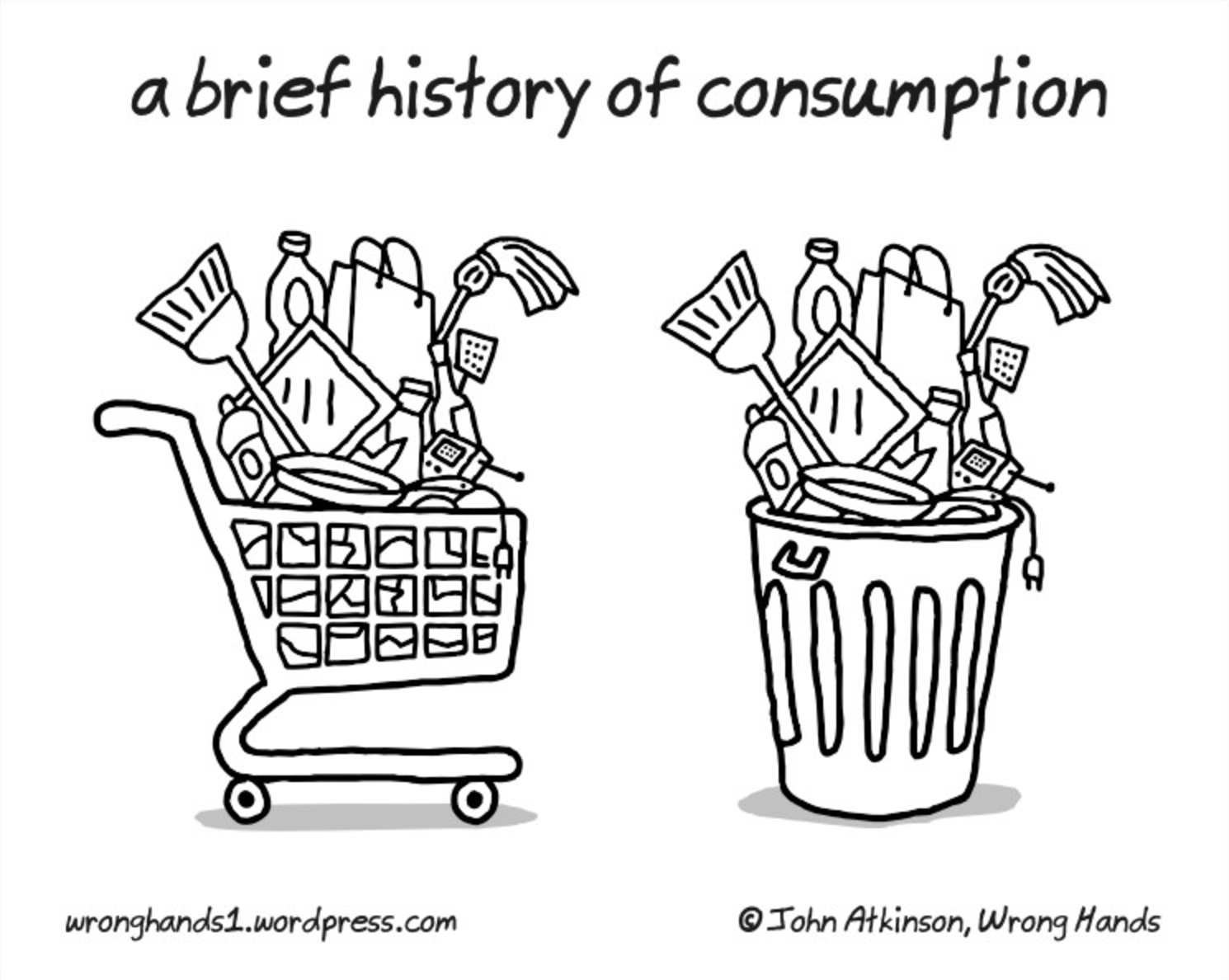The Western culture of hyper-consumption can be pervasive and convincing. From the time we are born, we see thousands of advertisements that subliminally encourage us to buy more, bigger, and expensive things. Some people have just never examined how this system works, or been taught of its problems. It seems natural to constantly buy things, throw them away, and buy new things again. Most people know that the lifestyle of an average person in North America would require the resources of 3+ planets, and the United States, for example, uses a third of the world's resources, despite having only 5% of the population. Fortunately, we can counter this culture of overconsumption! Educating future (and current) generations in concrete, experiential ways really works to help people change their lifestyles and analyse the systems that encourage overconsumption.
Sustainability in school
There is so much room for growth in teaching environmental literacy and sustainability in school. It is a challenge to change such deeply-ingrained behaviours. However, schools often contribute to this. For instance, a student studying economics often learns primarily about unsustainable 'growth,' and very little about the economics of environmental destruction. Instead, at every stage of education, we can implement a curriculum that includes sustainability literacy and knowledge about our environmental systems, and that even shifts people's behaviour and increases motivation to be sustainable. Plus, teachers are in a unique position to change lives- most people can think of an inspiring teacher who encouraged them and maybe even changed the direction of their life. Progress is being made, with schools in Portland, Oregon making education about climate change and activism required. This kind of schooling is just what we need to make compassionate environmental leaders
Learning by doing
Experiential learning is the best way to show the value of sustainable living, by connecting personal habits to larger social issues. Simple exercises, and short amounts of time (as few as a couple of days) can transform the way people think about habits that they have been practicing for years. University professors are experimenting with different ways of getting students involved with sustainability and consumption; traditional classroom learning is not as effective at inspiring people to change their behavior. (In that vein, simply telling people about a problem or that they should change is not as effective as showing them, or having them try out a solution for themselves). In addition, young adults (18-25), have the lowest income of all adults. This makes these years, where many people are students, a perfect time for education before they have the financial means to fully enter our over-consuming society.
New studies suggest that integrating concrete strategies for how to solve environmental problems, instead of just presenting them in an open discussion, will be the best way to rise above our current unsustainable system.
For instance, in one such assignment, professors had students collect all the trash they produced in 24 hours and bring it to class. Most people don't measure the trash that they make, and they certainly don't bring it around with them to show their friends. Actually seeing their garbage, and the cumulative garbage of a whole class, made them realise how much they actually use and throw away. In another assignment, students were challenged to not buy any non-essential items for up to seven days, and then reflect on their experience. In follow-up surveys, students reported that they had voluntarily continued with the experiment, and it had changed their consumption habits.

Integrate big-picture knowledge with individual tools
Simply halting consumption wouldn't completely fix our society- after all, our economy as it currently exists depends on people helping others by purchasing their goods and services. Overall, though, getting students thinking about global environmental problems, economic structures, and social pressures will help them to better navigate their role in the world and inspire them to change it for the better. Showing students how to concretely reduce their individual consumption while also giving them the capacity to engage with the global structures that govern our economies is key to creating a new generation of environmental leaders and conscious citizens.
A whole new world
Picture a future where it's normal and expected for people to know about sustainability. Surely, more children would be inspired in school to study environmental subjects, and we would have more people actively working to change our societies for the better. Although our current economic system relies on overconsumption, we can shift economic power to sustainable products and services, and rely on less consumption overall. This cultural shift will lead to more sustainable management and less waste of our resources. Individually, and then as a society, we can begin to devalue the consumerism that puts such a strain on the earth's resources. The earth can support the current and future population if we tread lightly- and new education will teach people how.
References:
Grauerholz, L., Bubriski-McKenzie, A., & Jacques, J. R. (2015). Teaching about Consumption and Sustainability. Transformative Dialogues: Teaching & Learning Journal, 8(2), 1-15.
Hadjichambis, A. C., Paraskeva-Hadjichambi, D., Ioannou, H., Georgiou, Y., & Manoli, C. C. (2015). Integrating Sustainable Consumption into Environmental Education: A Case Study on Environmental Representations, Decision Making and Intention to Act. International Journal Of Environmental And Science Education, 10(1), 67-86.
Kopnina, H. (2015). Sustainability in environmental education: new strategic thinking. Environment, Development & Sustainability, 17(5), 987-1002. doi:10.1007/s10668-014- 9584-z
Andie Mitchell is a university student from the United States who studies environmental studies and international affairs. She's passionate about ecofeminism, sustainable food systems, and anything else that helps the earth in the fight against climate change.
[Images: Shutterstock]
Read this next: How Empowering Women Through Female Education And Family Planning Helps To Fight Climate Change
We're in a climate emergency and it's going to take all of us to get out of it. That's why 1 Million Women is building a global community of women committed to fighting climate change with our daily actions. To join the (free) movement just click the button below!

